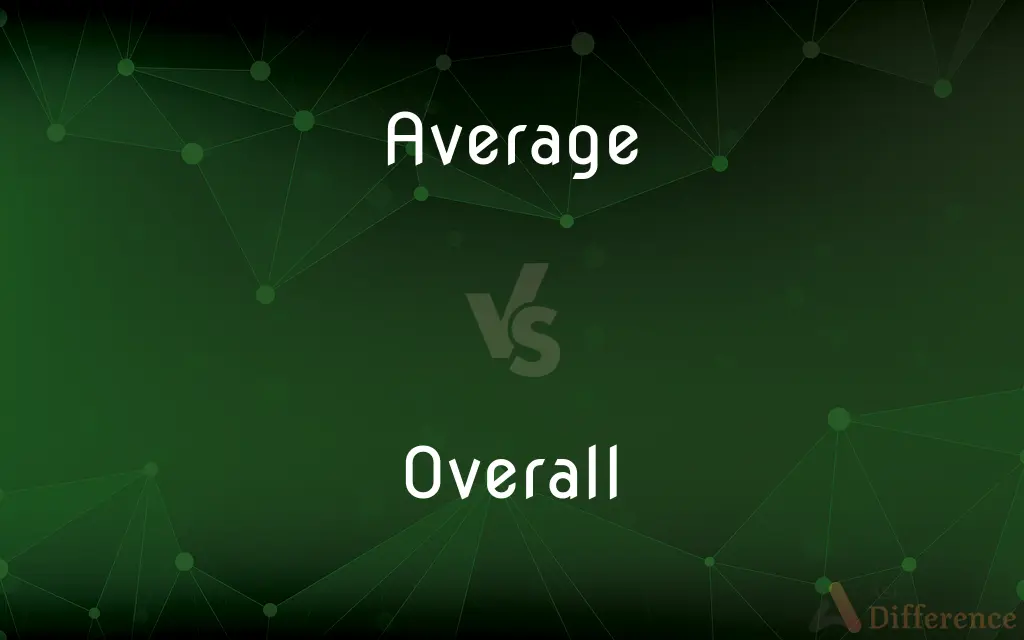Average vs. Overall — What's the Difference?
By Maham Liaqat & Urooj Arif — Updated on March 13, 2024
Average represents a value obtained by dividing the sum of several quantities by their number, while overall refers to considering everything or everyone, encompassing the total scope or extent.

Difference Between Average and Overall
Table of Contents
ADVERTISEMENT
Key Differences
Average is a statistical measure that is often used to find the central or typical value among a set of numbers, by summing them up and dividing by the count of these numbers. It provides insight into the general magnitude of the values in the dataset, often used in contexts like calculating the average income, temperature, or grades, which helps to simplify complex data sets for easier understanding and comparison. On the other hand, overall pertains to the entirety of something, taking into account all parts, aspects, or individuals involved. It doesn't imply any calculation but refers to a comprehensive scope or total effect. While average focuses on finding a representative value within a group, overall is used to describe the aggregate or total picture without dividing or distributing it into representative parts.
When discussing performance, for example, the average score might be used to assess an individual's typical performance level across several tests, while the overall performance would consider not just test scores but all aspects of performance, including non-quantifiable elements like effort, improvement, and participation. In this sense, overall encompasses a broader evaluation than average, which zeroes in on a specific quantifiable aspect.
In research and data analysis, the average is crucial for providing a simple understanding of complex datasets, allowing for comparisons across different sets of data. However, the overall context or results are equally important as they provide a holistic view of the findings, including outliers, patterns, and trends that the average alone might not reveal.
While averages can sometimes be misleading if there are extreme values in the data set (since they tend to skew the average), the overall perspective gives a comprehensive view, acknowledging all components, including extremes. This distinction underscores the importance of using both concepts appropriately in analysis and decision-making to ensure both accuracy and comprehensiveness.
In environmental studies, the average temperature of a region over time can indicate trends like global warming, but the overall climate change impact includes not just temperature but also changes in precipitation patterns, extreme weather events, and sea-level rise, illustrating how both average and overall offer valuable, yet different, insights.
ADVERTISEMENT
Comparison Chart
Definition
Sum of quantities divided by number of quantities
Considering everything in total
Focus
Central or typical value
Total scope or extent
Application
Simplifies complex data for comparison
Provides comprehensive view
Example Usage
Calculating average income or grades
Describing total performance
Limitations
Can be skewed by extreme values
May overlook specific details
Compare with Definitions
Average
Often used to represent the typical or central value in a dataset.
The average income in the area is $50,000.
Overall
Encompasses all parts or aspects of something.
Overall satisfaction with the service was high.
Average
Utilized for simplification and comparison.
Comparing average scores helps identify trends in student performance.
Overall
Does not imply mathematical calculation but a comprehensive scope.
The overall impact of the policy was positive.
Average
A mathematical concept denoting the mean value of a set of numbers.
The average grade in the class was B.
Overall
Referring to considering everything or the entirety of a situation.
The overall cost includes materials and labor.
Average
Can be influenced by outliers or extreme values.
The average was skewed by a few very high incomes.
Overall
Important for providing a holistic view.
The overall health of the ecosystem is our priority.
Average
Calculated as the sum of values divided by the number of values.
The average temperature in July was 85°F.
Overall
Used to describe the aggregate or total effect.
The overall performance of the team was commendable.
Average
In colloquial language, an average is a single number taken as representative of a non-empty list of numbers. Different concepts of average are used in different contexts.
Overall
Taking everything into account
The governors and head have overall responsibility for managing the school
The overall effect is impressive
Average
A number expressing the central or typical value in a set of data, in particular the mode, median, or (most commonly) the mean, which is calculated by dividing the sum of the values in the set by their number
The proportion of over-60s is above the EU average of 19 per cent
Overall
Taken as a whole; in all
Overall, 10,000 jobs will go
Average
The apportionment of financial liability resulting from loss of or damage to a ship or its cargo.
Overall
A loose-fitting coat or one-piece garment worn over ordinary clothes for protection against dirt or heavy wear
A pair of overalls
Men in grubby blue overalls
Average
Constituting the result obtained by adding together several amounts and then dividing this total by the number of amounts
The average temperature in May was 4°C below normal
Overall
From one end to the other
The overall length of the house.
Average
Amount to or achieve as an average rate or amount over a period of time; mean
Annual inflation averaged 2.4 per cent
Overall
Including everything; comprehensive
The overall costs of medical care.
Average
A number that typifies a set of numbers of which it is a function.
Overall
Regarded as a whole; general
My overall impression was favorable.
Average
See arithmetic mean.
Overall
On the whole; generally
Enjoyed the performance overall.
Average
An intermediate level or degree
Near the average in size.
Overall
Chiefly British A loose-fitting protective outer garment; a smock.
Average
The usual or ordinary kind or quality
Although the wines vary, the average is quite good.
Overall
Overalls Loose-fitting pants, usually of strong fabric, with a bib front and shoulder straps, often worn over regular clothing as protection from dirt.
Average
(Sports)The ratio of a team's or player's successful performances such as wins, hits, or goals, divided by total opportunities for successful performance, such as games, times at bat, or shots
Finished the season with a .500 average.
A batting average of .274.
Overall
All-encompassing, all around.
Average
The loss of a ship or cargo, caused by damage at sea.
Overall
Generally; with everything considered.
Average
The incurrence of damage or loss of a ship or cargo at sea.
Overall
(British) A garment worn over other clothing to protect it; a coverall or boiler suit. A garment, for manual labor or for casual wear, often made of a single piece of fabric, with long legs and a bib upper, supported from the shoulders with straps, and having several large pockets and loops for carrying tools.
Average
The equitable distribution of such a loss among concerned parties.
Overall
A garment, worn for manual labor, with an integral covering extending to the chest, supported by straps.
Average
A charge incurred through such a loss.
Overall
Everywhere.
Average
(Nautical)Small expenses or charges that are usually paid by the master of a ship.
Overall
Work clothing consisting of denim trousers (usually with a bib and shoulder straps)
Average
(Mathematics)Of, relating to, or constituting an average.
Overall
A loose protective coverall or smock worn over ordinary clothing for dirty work
Average
Being intermediate between extremes, as on a scale
A movie of average length.
A player of average ability.
Overall
Involving only main features;
The overall pattern of his life
Average
Usual or ordinary in kind or character
A poll of average people.
Average eyesight.
Overall
Including everything;
The overall cost
The total amount owed
Average
Assessed in accordance with the law of averages.
Average
(Mathematics)To calculate the average of
Average a set of numbers.
Average
To do or have an average of
Averaged three hours of work a day.
Average
To distribute proportionately
Average one's income over four years so as to minimize the tax rate.
Average
To be or amount to an average
Some sparrows are six inches long, but they average smaller. Our expenses averaged out to 45 dollars per day.
Average
(mathematics) The arithmetic mean.
2=The average of 10, 20 and 24 is (10 + 20 + 24)/3 = 18.
Average
(statistics) Any measure of central tendency, especially any mean, the median, or the mode.
Average
Financial loss due to damage to transported goods; compensation for damage or loss.
Average
Customs duty or similar charge payable on transported goods.
Average
Proportional or equitable distribution of financial expense.
Average
(sports) An indication of a player's ability calculated from his scoring record, etc.
Batting average
Average
In the corn trade, the medial price of the several kinds of grain in the principal corn markets.
Average
The service that a tenant owed his lord, to be done by the animals of the tenant, such as the transportation of wheat, turf, etc.
Average
(not comparable) Constituting or relating to the average.
The average age of the participants was 18.5.
Average
Neither very good nor very bad; rated somewhere in the middle of all others in the same category.
I soon found I was only an average chess player.
Average
Typical.
The average family will not need the more expensive features of this product.
Average
(informal) Not outstanding, not good, banal; bad or poor.
Average
(transitive) To compute the average of, especially the arithmetic mean.
If you average 10, 20 and 24, you get 18.
Average
(transitive) Over a period of time or across members of a population, to have or generate a mean value of.
The daily high temperature last month averaged 15°C.
I averaged 75% in my examinations this year.
Average
(transitive) To divide among a number, according to a given proportion.
To average a loss
Average
(intransitive) To be, generally or on average.
Average
That service which a tenant owed his lord, to be done by the work beasts of the tenant, as the carriage of wheat, turf, etc.
Average
A tariff or duty on goods, etc.
Average
A mean proportion, medial sum or quantity, made out of unequal sums or quantities; an arithmetical mean. Thus, if A loses 5 dollars, B 9, and C 16, the sum is 30, and the average 10.
Average
Any medial estimate or general statement derived from a comparison of diverse specific cases; a medium or usual size, quantity, quality, rate, etc.
Average
In the English corn trade, the medial price of the several kinds of grain in the principal corn markets.
Average
Pertaining to an average or mean; medial; containing a mean proportion; of a mean size, quality, ability, etc.; ordinary; usual; as, an average rate of profit; an average amount of rain; the average Englishman; beings of the average stamp.
Average
According to the laws of averages; as, the loss must be made good by average contribution.
Average
To find the mean of, when sums or quantities are unequal; to reduce to a mean.
Average
To divide among a number, according to a given proportion; as, to average a loss.
Average
To do, accomplish, get, etc., on an average.
Average
To form, or exist in, a mean or medial sum or quantity; to amount to, or to be, on an average; as, the losses of the owners will average twenty five dollars each; these spars average ten feet in length.
Average
A statistic describing the location of a distribution;
It set the norm for American homes
Average
Amount to or come to an average, without loss or gain;
The number of hours I work per work averages out to 40
Average
Achieve or reach on average;
He averaged a C
Average
Compute the average of
Average
Approximating the statistical norm or average or expected value;
The average income in New England is below that of the nation
Of average height for his age
The mean annual rainfall
Average
Lacking special distinction, rank, or status; commonly encountered;
Average people
The ordinary (or common) man in the street
Average
Of no exceptional quality or ability;
A novel of average merit
Only a fair performance of the sonata
In fair health
The caliber of the students has gone from mediocre to above average
The performance was middling at best
Average
Around the middle of a scale of evaluation of physical measures;
An orange of average size
Intermediate capacity
A plane with intermediate range
Medium bombers
Average
Relating to or constituting the most frequent value in a distribution;
The modal age at which American novelists reach their peak is 30
Average
Relating to or constituting the middle value of an ordered set of values (or the average of the middle two in an even-numbered set);
The median value of 17, 20, and 36 is 20
The median income for the year was $15,000
Common Curiosities
Is overall more important than average?
Importance varies by context; overall provides a broad perspective, while average offers specific quantitative insights. Both are valuable for different reasons.
How can averages be misleading?
Averages can be misleading if there are outliers in the data that skew the result, giving an inaccurate representation of the typical value.
What is the key difference between average and overall?
The key difference is that average calculates a central value by summing and dividing by the count, while overall refers to the entirety or total scope of something.
Can average and overall give the same information?
While they may sometimes align in insights, they usually offer different perspectives; average provides a statistical mean, whereas overall gives a comprehensive scope.
Why is it important to know both the average and the overall?
Knowing both provides a fuller understanding, with average offering a simplified comparative measure and overall giving a complete picture, including extremes and outliers.
Does overall always include every single detail?
While overall aims to consider all parts or aspects, it may sometimes summarize to capture the total effect rather than detailing every component.
How can businesses use average and overall in planning?
Businesses use averages to benchmark and compare specific quantitative aspects, while overall perspectives help in strategic planning by considering all factors, including non-quantifiable ones.
How do averages help in everyday decisions?
Averages simplify complex information, aiding in comparisons and decisions by providing a typical value for reference.
Can the overall perspective be quantified?
While overall encompasses all aspects, including qualitative ones, it can sometimes be quantified in terms of total effects or outcomes but not in the same way as averages.
Why use average instead of median or mode?
The choice depends on the data and the goal of analysis; average is useful for finding a central value, but median or mode may be better for skewed data or to find the most common value.
Share Your Discovery

Previous Comparison
Kinect vs. Wii
Next Comparison
Protest vs. RemonstrateAuthor Spotlight
Written by
Maham LiaqatCo-written by
Urooj ArifUrooj is a skilled content writer at Ask Difference, known for her exceptional ability to simplify complex topics into engaging and informative content. With a passion for research and a flair for clear, concise writing, she consistently delivers articles that resonate with our diverse audience.
















































